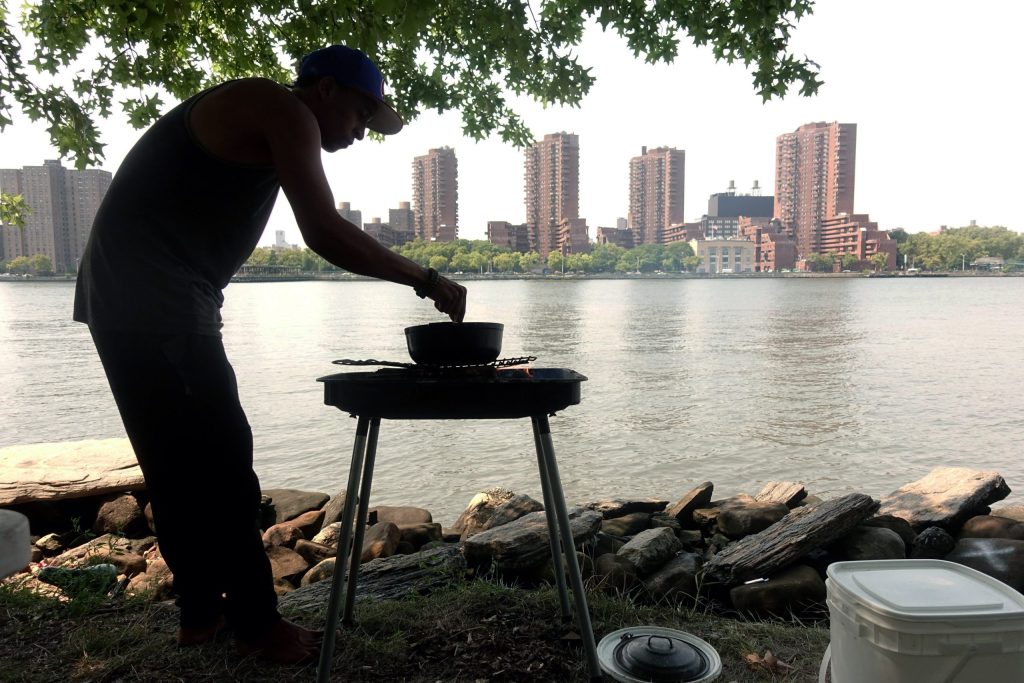New York City has denied shelter to 1,660 migrants since the May rollout of a new system of time limits designed to help the city reduce the number of people living in its migrant shelters, new figures obtained by THE CITY show.
The updated numbers from the city’s Office of Emergency Management come a week after THE CITY documented a burgeoning homeless encampment outside the city-sponsored Randall’s Island migrant shelter.
When Mayor Eric Adams got a question about the encampment at his once-a-week open-press briefing, his chief of staff, Camille Varlack, responded, saying that people barred from city shelters are still eligible to receive a city-sponsored bus ticket out to another destination in the U.S.
“That option remains open to them,” she said, adding: “The issue of the encampments will be addressed.”
City officials will meet with people living in the encampment, Varlack promised, to “make sure that they’re given the resources that they can move on.”
Many encampment residents, however, say they’d ended up there because they hadn’t been able to access resources the city claims it provides to help them thrive outside of the shelter system.
“It doesn’t seem just, that here in the country of a million opportunities, the capital of the world, there are humble people living in the street,” 23-year-old encampment resident Interviewed on Tuesday, Guillermo Contreras, said, in Spanish: “There are so many places indoors where people could sleep.”
Contreras has been living in the encampment for three months after the 30 days he had been allotted to live in the Randall’s Island tent shelter expired. He said his request for additional time in a city shelter was denied because he hadn’t applied for asylum — and that he hadn’t done so because it had been impossible to make an appointment at the city’s application center for asylum-seekers.
Now he is barred from using the city’s asylum-seeker application center because appointments there are only available to people living in a migrant shelter.
Immigrants’ rights advocates slammed the Adams administration’s approach, pointing to the inevitably of people living outside after being barred from city shelters.
“Mayor Adams has doubled and tripled down on attacking New York City’s long-standing right to shelter policies by prioritizing shelter evictions instead of people’s ability to live safely with a roof over their heads,” said Murad Awawdeh, president and CEO of the New York Immigration Coalition.
“The obvious result of these attacks is that people are forced to sleep on the street. Clearing encampments without providing alternative housing is another example of his short-sighted policies.”
‘Not Always Pretty, Not Always Perfect’
The 1,660 denials over the past 10 weeks represent a fraction of the adults living in the city’s shelters without children who are subject to the new 30-day restriction.
Another 16,754 were screened during that time for continued shelter eligibility under state rules that grant emergency housing assistance to recent migrants if they’ve applied for Temporary Protected Status or submitted asylum applications.
About 80% of those applicants received extensions, according to Josh Goldfein, an attorney for the Legal Aid Society, citing data shared by city officials as part of an ongoing settlement agreement.
Some families with children, who make up the majority of the 65,000 migrants living in shelters, are now subject to 60-day limits in the city’s system.
Speaking at Tuesday’s press briefing, Adams commended his administration’s handling of the ongoing situation, with what he described as little financial support from the federal government.
“What this team is doing is managing a crisis that’s not sustainable,” Adams said. “It’s not always pretty, it’s not always perfect, but we have managed a crisis that is beyond anyone’s expectation.”
The number of newly arriving has dropped dramatically in recent weeks following an executive order from President Joe Biden restricting the number of migrants who can cross the border and apply for asylum.
Altogether, more than 200,000 migrants traveling from the southern border passed through the city’s emergency shelters since spring of 2022.

